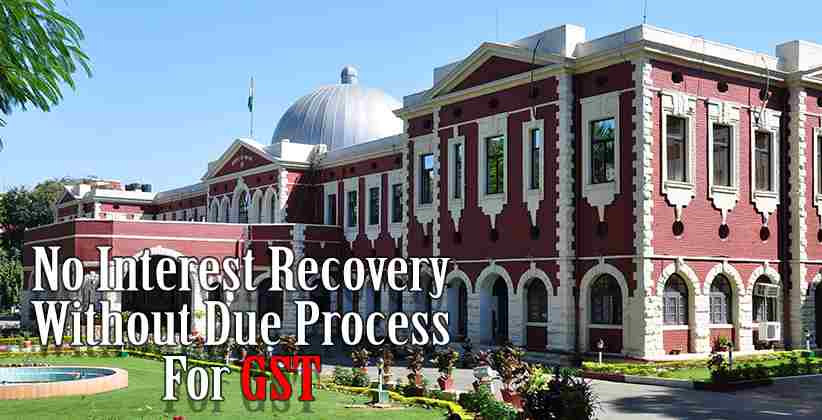Interest recoveries cannot be initiated against businesses under the GST Laws without a prior show cause notice and adjudication proceedings, Jharkhand High Court mentioned in a recent ruling.
A two-member bench of Justice HC Mishra and Justice Deepak Roshan overruled an order which was earlier issued by the GST Department for a Partnership firm for recovery of interest on unpaid taxes. The court also quashed the garnishee order for the attachment of the firms bank account since the authorities failed to follow the prescribed procedure and provisions as mentioned under Central Goods and Service Tax Act, 2017.
The judgment is based on sound principles of law that no liabilitywhether of tax, interest or penaltycan be fastened on a taxpayer without allowing him to present his case, Rajat Bose, partner at Shardul Amarchand Mangaldas & Co. said.
He further added, Revenue authorities have initiated proceedings or even served notices for cancellation of goods and services tax registration, Bose pointed out. And taxpayers have had to cough up the amounts even without a formal hearing,
The Tax of Interest and Penalties has been an antagonistic issue since the start of the nationwide indirect tax. In several examples, courts have stated that the authorities must use their powers to attach bank accounts economically for recovering tax.
Mahadeo Construction, a partnership firm, moved the Jharkhand High Court and challenged an order passed by the GST authorities which directed it to pay an interest of Rs 19 lakh on account of delayed filing of monthly returns in the form of GSTR-3B for February and March 2018. The firm contested the claims of delayed filing. It argued that the tax liability imposed on it was unmaintainable since it was initiated without following a fair adjudication process.
The revenue department had contested this on grounds that interest liability is automatically triggered only when theres a delay in payment of tax and that the partnership had failed to discharge its tax liability despite the issuance of interest-recovery notices. Subsequently, the department had to pledge garnishee proceedings by attaching the bank accounts.
But the high court dismissed the GST departments arguments. The CGST Act, 2017 specifically points out that it requires a tax officer to serve a notice on account of any tax not being paid or short paid. This would entail that the delayed payment of tax and the notice must specify the amount of recoverable interest. Also, the revenue department cannot initiate recovery proceedings without first issuing a notice for the delay in payment.
The court agreed with the GST departments stance that the liability to pay interest arises automatically. But it clarified that if this liability is disputed, the department must first initiate adjudication proceedings.
If the taxpayer contests the outcome of this process, then too recovery process must come to a halt, the high court said.
The high court has amply clarified the due process that the department must follow in cases where the taxpayer is disputing liability, experts pointed out.
The GST law requires assessees to pay interest on a Suo-moto basis in case there is an undisputed delay in paying tax,Nangia Andersons Tanushree Roy told. In such cases, she pointed out, no adjudication is required as the delay is admitted by the assessee. But even where the liability is disputed, the authorities have resorted to recovery without any adjudication, Roy added.
To recover tax dues, the revenue department has the power to initiate garnishee proceedings whereunder third partieswhich owe money to the taxpayersare directed to retain or pay such amount in favor of the department.
Such proceedings too can be initiated only after completion of the adjudication process; the high court has held. This will prevent unnecessary threats and harassment by the tax department in order to expedite recovery of tax, interest, or penalties, Bose said.
The citizen can also deny/demand the legitimacy of the outcome of the adjudication process at the High Court or the Supreme Court, Dhruva Advisors Ritesh Kanodia pointed out. The law already provides an appeal mechanism where an assessee can deposit a certain percentage of dues and no recoveries are made till the disposal of such appeals, he said.
In such instances too, the high court has clarified, garnishee proceedings cannot be initiated till such appeals are pending for disposal, Kanodia added.






